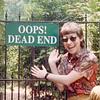Take a photo of a barcode or cover

nearfutures 's review for:
The Mother of All Questions
by Rebecca Solnit
I picked up The Mother of All Questions because I really enjoyed Solnit's more well-known collection, Men Explain Things To Me. This collection is a solid sequel, although I have the same minor complaints that I did with the first book: some of the essays are stronger than others, and Solnit tends to re-use the same statistics and anecdotes. The latter point is fine when the essays are read separately, but begins to feel repetitive if you read the book all at once, as I did.
My favorite essays were in the latter half of the book, where Solnit moves more into commentary on specific literary texts. Her ideas are incisive, thoughtful, and original. I particularly enjoyed "80 Books No Woman Should Read," her sharp response to "The 60 Best Books Every Man Should Read" published in Esquire, and her subsequent reflection on the enormous Internet response and backlash titled "Men Explain Lolita to Me." Her final essay in the book, titled "Giantess," was my favorite -- it is her love letter to the 1956 George Stevens film Giant. Her passion and relationship with the film (and other texts) was fascinating and well-articulated.
I thought the weakest essay was "A Short History of Silence." The essay is over fifty pages and divided into four parts with poetic names, i.e. "I. The Ocean around the Archipelago", and summarizes the history of silencing in relation with women and violence in our culture. The divisions between parts felt arbitrary to me and the pay-off for the length was simply not there.
Much of Solnit's writing synthesizes what I find are fairly mainstream liberal and feminist ideas about policy and culture. While I can appreciate essays in this category as well-constructed, I generally don't learn anything new from them. But when Solnit writes about specific media (as in "Giantess"), the essays are much more original -- these were the essays I enjoyed more. That said, I think the collection is worth reading as a whole and your specific familiarity/relationship with feminist praxis will influence which essays are the most powerful and informative.
My favorite essays were in the latter half of the book, where Solnit moves more into commentary on specific literary texts. Her ideas are incisive, thoughtful, and original. I particularly enjoyed "80 Books No Woman Should Read," her sharp response to "The 60 Best Books Every Man Should Read" published in Esquire, and her subsequent reflection on the enormous Internet response and backlash titled "Men Explain Lolita to Me." Her final essay in the book, titled "Giantess," was my favorite -- it is her love letter to the 1956 George Stevens film Giant. Her passion and relationship with the film (and other texts) was fascinating and well-articulated.
I thought the weakest essay was "A Short History of Silence." The essay is over fifty pages and divided into four parts with poetic names, i.e. "I. The Ocean around the Archipelago", and summarizes the history of silencing in relation with women and violence in our culture. The divisions between parts felt arbitrary to me and the pay-off for the length was simply not there.
Much of Solnit's writing synthesizes what I find are fairly mainstream liberal and feminist ideas about policy and culture. While I can appreciate essays in this category as well-constructed, I generally don't learn anything new from them. But when Solnit writes about specific media (as in "Giantess"), the essays are much more original -- these were the essays I enjoyed more. That said, I think the collection is worth reading as a whole and your specific familiarity/relationship with feminist praxis will influence which essays are the most powerful and informative.